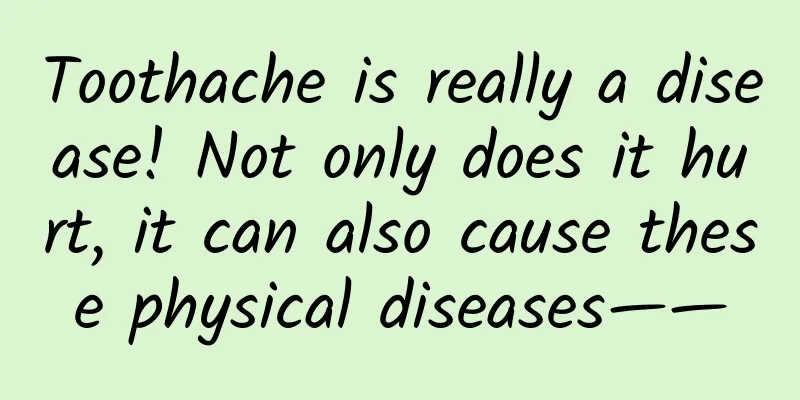Toothache is really a disease! Not only does it hurt, it can also cause these physical diseases——

|
Review expert: Wang Xuejiang, professor at Capital Medical University Minor problems in the mouth are just teeth “being upset” and will go away if you just bear with it? If you can’t stand it, you should seek medical attention immediately! Oral diseases can affect the health of the whole body, and this is no joke. When the bacteria in the mouth multiply in large numbers, they may enter other parts of the body through the blood circulation and cause a series of systemic diseases. 0 1Common Oral Diseases There are many types of oral diseases, the most common ones include the following: Oral ulcers, commonly known as "mouth sores", are an ulcerative injury to the oral mucosa. Biting, scratching with a toothbrush or hard objects, scalding with overheated food and other factors can cause oral ulcers. When oral ulcers occur, the pain is severe, with obvious local burning pain. In severe cases, it can also affect eating and speaking. Dental caries, also known as tooth decay, is caused by the acid produced by the decomposition of food residues by bacteria in the mouth, which corrodes the tooth surface over a long period of time. Early dental caries may not have obvious symptoms. As the disease progresses, tooth sensitivity and pain will occur. In severe cases, it can lead to pulpitis and periapical lesions. Periodontal disease is also a common oral disease. It is caused by the long-term stimulation of periodontal tissues by bacteria and their products in dental plaque, including gum disease and periodontitis. Periodontal disease not only affects oral health, but is also a potential risk factor for certain systemic diseases. Dental caries and periodontitis can also lead to dental pulp infection, causing pulpitis and apical periodontitis . These two inflammations usually manifest as toothaches. Pulpitis is spontaneous, paroxysmal pain in the teeth, which worsens at night; apical periodontitis is pain when the teeth are bitten, and can also cause swollen gums and facial swelling. Other oral diseases include wisdom teeth, pericoronitis, malocclusion, tooth wear, oral cancer, etc. 02The impact of oral diseases When we have toothache or oral ulcers, we intuitively feel that it will affect eating and talking. In fact, the impact of oral diseases on the body is far more than that. It is also closely related to diabetes, cardiovascular and cerebrovascular diseases, rheumatism, kidney disease, etc. When ulcers appear in the mouth, periodontal pathogens (such as Porphyromonas gingivalis) can enter the blood through the ulcer surface and induce atherosclerosis. Tooth loss caused by caries can affect the development of the jaw. If not treated in time, it may also cause bacterial endocarditis or endarteritis, as well as various arthritis, especially infectious arthritis. Studies have shown that people with periodontal disease are 1.4 times more likely to develop coronary heart disease, 2.1 times more likely to have a stroke, and 2.3 times more likely to have myocardial infarction than those with healthy periodontal disease. A large proportion of patients with coronary heart disease have moderate or severe periodontal disease. The inflammatory process of periodontitis is also closely related to diabetes and is an important risk factor for type 2 diabetes and poor blood sugar control. The prevalence of periodontitis in diabetic patients is three times higher than that in non-diabetic people. There are also some special groups who need to pay more attention to oral health: If a pregnant woman suffers from periodontitis and the symptoms are severe, the risk of premature birth increases by 7.5 times. For children who are still in the growth stage, caries of deciduous teeth will affect the development of permanent tooth germs. For the elderly, tooth loss affects chewing and may lead to malnutrition. 03Preventing oral diseases In our daily lives, we can maintain oral health in many ways. First of all, you should pay attention to daily oral hygiene . It is recommended to brush your teeth twice a day and use dental floss or mouthwash for auxiliary cleaning after meals. Secondly, in terms of diet, you should control sugar intake, quit smoking and limit alcohol, and consume more foods rich in protein, high fiber, high calcium and high vitamins. In addition, it is also very important to correct bad habits in time. If you have swollen and painful gums, bleeding, bad breath, loose teeth, or ulcers that have not healed for more than two weeks, you should go to the hospital in time to avoid delays that may worsen the condition. |
<<: They dare to squeeze into any narrow place. Are cats actually liquid?
>>: Juyongguan: How did ancient China “play” with light-speed communication and cryptography
Recommend
How to plan a social event? Explanation of the steps to plan an event!
The article combines the author's own experie...
How to plan a marketing campaign that reaches 1 million people
When I first learned about the event, I actually ...
USB-C is about to become the future. Are you really ready?
As today's laptops become thinner and lighter,...
Latest! The new member of the "10,000-ton destroyer" has submitted his work!
The new domestic destroyer Wuxi Officially listed...
APP operation: How to design an activity that users can’t stop
520 has just passed and the Dragon Boat Festival ...
It’s so thin that it’s transparent! Can such sun protection clothing still protect against the sun?
Reviewer: Yang Yuqiu Professor of Textile Materia...
Migratory locusts: They can run marathons and also love to race 100 meters
Do you remember the global locust plague in early...
Do hummingbirds have Mulan? To avoid being disturbed by their own kind, some females choose to "dress as men"
Produced by: Science Popularization China Author:...
How big is the space for content e-commerce that directly realizes the value of the knowledge economy?
At present, with the popularity of " Fenda &...
Unveiling Omicron: Will it be the last coronavirus variant to wreak havoc around the world?
Written by: Zhu Hengheng Editor: Wang Haha Layout...
The latest domestic search rankings for 2018 are revealed! Which one has the largest traffic?
The latest search engine market rankings for Apri...
106 people in a kindergarten in South Korea suffered from food poisoning! What exactly happened? Attached details
Recently, 106 people in a kindergarten in South K...
How is the advertising fee of Douyin Star Map calculated? Douyin Star Chart Advertising Fee Billing Method Revealed
Self-media and short videos are very popular nowa...
They are from Afghanistan and have been "taking refuge" in China for 3 years! Netizens: It's not easy...
Recently, with the sudden changes in the situatio...
To create a hit short video, keep these points in mind when writing a convincing copy!
The Internet industry changes its trends almost e...









